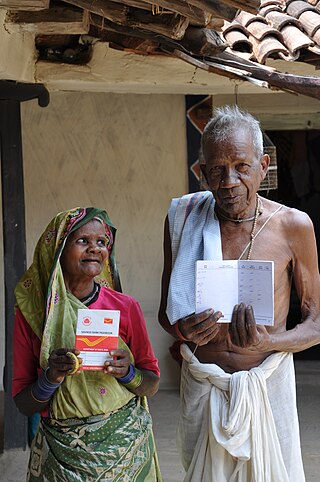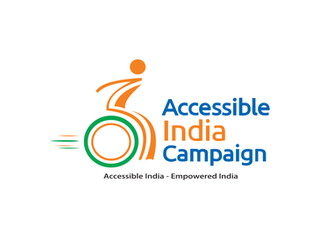Related Research Articles

International Day of Persons with Disabilities is an international observance promoted by the United Nations since 1992. It has been observed with varying degrees of success around the planet. The observance of the Day aims to promote an understanding of disability issues and mobilize support for the dignity, rights and well-being of persons with disabilities. It also seeks to increase awareness of gains to be derived from the integration of persons with disabilities in every aspect of political, social, economic and cultural life. It was originally called "International Day of Disabled Persons" until 2007. Each year the day focuses on a different issue.

The Ministry of Social Justice and Empowerment is a Government of India ministry. It is responsible for welfare, social justice and empowerment of disadvantaged and marginalised sections of society, including scheduled castes (SC), Other Backward Classes (OBC), LGBT people, the disabled, the elderly, and the victims of drug abuse. It also helps in the enforcement of legislation with regards to these marginalized groups to better enforce anti-discrimination policies.

The Convention on the Rights of Persons with Disabilities is an international human rights treaty of the United Nations intended to protect the rights and dignity of persons with disabilities. Parties to the convention are required to promote, protect, and ensure the full enjoyment of human rights by persons with disabilities and ensure that persons with disabilities enjoy full equality under the law. The Convention serves as a major catalyst in the global disability rights movement enabling a shift from viewing persons with disabilities as objects of charity, medical treatment and social protection towards viewing them as full and equal members of society, with human rights. The convention was the first U.N. human rights treaty of the twenty-first century.
india.gov.in is the Indian government’s web portal for citizens. It presents information resources and online services from government sources, accessible from a single point. It is also known as the National Portal of India.
Pandit Deendayal Upadhyaya National Institute for Persons with Physical Disabilities (Divyangjan) (P.D.U.N.I.P.P.D.) is an autonomous organisation under the administrative and financial control of Ministry of Social Justice and Empowerment, government of India.

The Rehabilitation Council of India (RCI) is the apex government body, set up under an Act of Parliament, to regulate training programmes and courses targeted at disabled, disadvantaged, and special education requirement communities. It is the only statutory council in India that is required to maintain the Central Rehabilitation Register which mainly documents details of all qualified professionals who operate and deliver training and educational programmes for the targeted communities. In the year 2000, the Rehabilitation Council of India (Amendment) Act, 2000, was introduced and notified consequently by the government of India. The amendment brought definitions and discussions provided within the earlier Rehabilitation Council of India Act, 1992, under the ambit of a larger act, namely, Persons with Disabilities Act, 1995.
Vidyaben Shah was an Indian social worker and activist known for her work with children, women and the elderly in India. While she was already serving as Vice-President, she was appointed the first non-officio President of the New Delhi Municipal Council (NDMC) by Prime Minister Indira Gandhi in 1975. She has held several leading positions in the field of social welfare since the 1940s. Vidyaben Shah died at the age of 97 on 19 June 2020 at her residence in Delhi, her son Mihir Shah confirmed the news of Vidyaben Shah death.

The National Social Assistance Programme (NSAP) is a Centrally Sponsored Scheme of the Government of India that provides financial assistance to the elderly, widows and persons with disabilities in the form of social pensions. The NSAP scheme only includes Below Poverty Line individuals as beneficiaries.
National Centre for Promotion of Employment for Disabled People is a New Delhi-based trust established in 1996. It was setup post enachment of 1995 PWD Act to champion the cause of disability rights. The organization's philosophy is that society needs to change traditionally held views of "charity and welfare to those of productivity and empowerment of disabled people". Its founder and first director was Javed Abidi and is currently headed by Arman Ali, who succeeded the founder on October 2018. It operates through a team of Program Managers and Program Officers who work on their specific areas.

Spastic Society of Gurgaon covers within its scope the programs on occupational therapy, counseling, vocational training and psychotherapy of the children with autism, cerebral palsy, intellectual disability and multiple disabilities in Haryana, India. It is India's first non-profit disability sector organization which was awarded ISO certification by United Kingdom Accreditation Service: United Registrar of Systems for quality of services rendered by it. It also works in the field of imparting counseling and psychotherapy to the parents and guardians of the disabled children. Mass camps are conducted for welfare of children with disabilities. Multiple single window services like assistance in issuance of disability certificates, NIRAMAYA cashless insurance cards, medical check ups, distribution of medicines and medical aids are rendered to disabled people in such camps. Being sponsored by Haryana Government it undertakes disability audits of organizations for assessing accessibility compliance by them.

Accessible India Campaign or Sugamya Bharat Abhiyan is a program which is set to be launched to serve the differently-able community of the country. The program comes with an index to measure the design of disabled-friendly buildings and human resource policies. The flagship program has been launched by the Prime Minister on 3 December 2015, the International Day of people with Disabilities. The initiative also in line with the Article 9 of the to which India is a signatory since 2007. The scheme also comes under Persons with Disabilities Act, 1995 under section 44, 45, 46 for equal Opportunities and protection of rights which provides non-discrimination in Transport to Persons with Disabilities.
Narayan Seva Sansthan is a non-profit charitable organisation based in Udaipur, Rajasthan, India. It is known for providing philanthropic services in the field of treatment and rehabilitation of polio affected people without discrimination of religion, region, caste, or gender. It was founded on 23 October 1985 by founder chairman Kailash Agarwal. The NGO is helping underprivileged people and disabled community to uplift and bring them in mainstream society. The NGO is helping in diagnosing, treatment, and rehabilitation in 480 branches of India and 49 in other part of the world for disabilities and improving physical disabilities, and socio-economic rehabilitation issues.
The Social Welfare Department is a department of the Hong Kong Government responsible for providing welfare services to the community.
The overall prevalence of people with disabilities is 4.52% of the population, i.e., 63.28 million, according to the ICMR's publication from the NFHS-5 survey 2019-21. India is a party to the United Nations Convention on the Rights of Persons with Disabilities. Legislation that affects people with disabilities in India includes the Rights of Persons with Disabilities Act, 2016, the Mental Health Care Act, 2017, the National Trust Act, 1999, and the Rehabilitation Council of India Act, 1992. People with disabilities in India are faced with negative social attitudes in the wider population.

People with disabilities in Pakistan are seen differently than in most Western countries due to cultural and religious beliefs. The lack of accurate epidemiological evidence on disabilities, insufficient resources, weak health care facilities and worker shortages are major obstacles to meeting the needs of disabled Pakistanis.
Disability affects many people in Zimbabwe in both rural and urban areas. In spite of services provided by the government, philanthropists and welfare agencies, people with disabilities and their families often face several barriers. Philanthropist, Jairos Jiri, started services for people with disability in Zimbabwe in the 1940s. He is regarded as the father or founder of disability work in Zimbabwe.

Singapore does not have a formal definition of disability. Singapore signed on to the Convention on the Rights of Persons with Disabilities in 2013 and coordinates the Enabling Masterplan with both government and non governmental organisations.

Apoorv Om is a deaf and Young Innovative artist and activist from New Delhi who advocates for deaf inclusion into the mainstream. Honoured as a Youth Activist for the UN Sustainable Development Goals and invited to the Second International Conference on Youth Volunteering & Dialogue at UNESCO's Headquarters, Om was awarded India's National Award for Empowerment of Persons with Disabilities(Divyangjan) by President of India and Ministry of Social Justice and Empowerment, Department of Emp. of PwDs, Government of India, on event of International Day of Persons with Disabilities at New Delhi on 3 December 2017. The President of the UN ECOSOC invited him to ECOSOC Youth Forum 2019 at United Nations headquarter, New York. Mr. Apoorv spoke about Climate action for paper recycling initiatives at all levels.

National Institute for the Empowerment of Persons with Visual Disabilities (Divyangjan), Dehradun is a premier organisation under the administrative control of Department of Empowerment of Persons with Disabilities (Divyangjan), Ministry of Social Justice and Empowerment, Government of India. Institute is training centre for the blind, located in an area of about 43 acres on Mussoorie-Dehradun Highway. It is also engaged in production of Braille literature, aids and appliances for visually disabled people. It also undertakes research and developmental activities ensuring emergence of disability inclusive policies, programmes and practices. The institute is governed by the Management & Advisory Bodies.
Health in Punjab involves the state of complete physical, mental and social well-being of the people in Punjab, India. Data of medical facilities, diseases and nutrition is used to determine the state of health of the population.
References
- ↑ "Deendayal Disabled Rehabilitation Scheme | National Portal of India".
- ↑ "Disabilities Affairs". disabilityaffairs.gov.in.
- ↑ India Education Diary Bureau (1 March 2019). "Thaawarchand Gehlot inaugurates 'National Conference on Deendayal Disabled Rehabilitation Scheme'".
- ↑ Impact & Policy Research Institute. "COVID19: Implications for People with Disabilities and the Elderly". The Citizen. Archived from the original on 5 December 2020. Retrieved 23 January 2021.
{{cite web}}:|author=has generic name (help) - ↑ "Covid-19: Extend help to women with disabilities". Hindustan Times. 30 May 2020.
- ↑ "Low teacher-pupil ratio plagues special schools in state". Deccan Herald. 2 February 2020.
- ↑ Nishtha Bharti, IndiaSpend com (31 January 2016). "Disabled care: Southern states show the way". Scroll.in.
- ↑ "'State govts should educate people about Persons with Disabilities Act schemes'". 27 May 2017.
- ↑ "MGNREGS hope for differently-abled in Odisha". The New Indian Express. 29 June 2019.
- ↑ "Universal identity cards to be issued to all disabled: Government". The Economic Times.